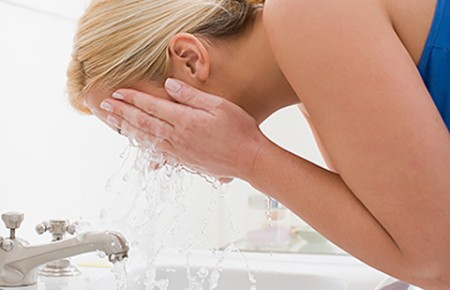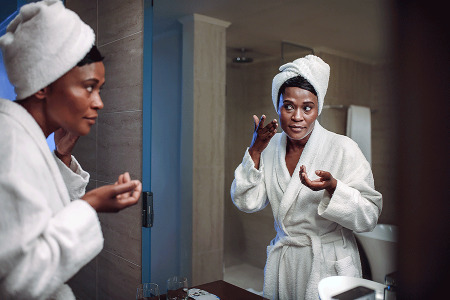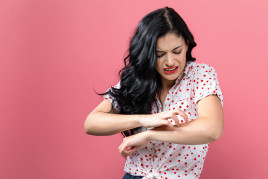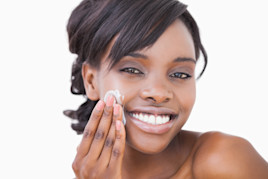7 rosacea skin care tips dermatologists recommend
How to care for your rosacea
The right rosacea skin care routine can help you feel more comfortable while managing your symptoms. Follow these tips from board-certified dermatologists.
Rosacea often makes skin sensitive and easily irritated, so proper skin care plays a key role in controlling this condition. The right skin care can:
Help your skin feel more comfortable.
Reduce rosacea flare-ups.
Improve the results you get from treatment.
To help you develop a skin care routine for rosacea, here’s what dermatologists recommend:
Choose rosacea friendly skin care products. When you have rosacea, many skin care products and cosmetics can irritate your skin. To reduce the likelihood of using a product that will irritate your skin, dermatologists recommend that you avoid products that contain any of the following ingredients:
- Alcohol
- Camphor
- Fragrance
- Glycolic acid
- Lactic acid
- Menthol
- Sodium lauryl sulfate (often found in shampoos and toothpaste)
- Urea
Go fragrance free
To reduce the likelihood of a product irritating your skin, choose fragrance-free (rather than unscented) products.

To reduce irritation, it's also best to:
- Select products that say they are made for sensitive skin and non-comedogenic (won’t clog pores).
- Choose a cream instead of a lotion or gel.
- Never use an astringent or toner.
Test skin care products and makeup before applying them to your face. Does it seem that everything you apply to your face stings? Testing can help you find products that don’t irritate your skin.
You can test products at home by following these tips from board-certified dermatologists, How to test skin care products.Cleanse your face twice a day — very gently. Cleansing will help remove oil and dirt that can worsen irritation.
To cleanse without further irritating your skin, dermatologists recommend that you:- Choose a mild, rosacea friendly cleanser (not soap).
- Apply the cleanser gently with your fingertips, using a circular motion.
- Rinse off the cleanser with warm water, using only your fingertips. You want to be gentle but also thoroughly remove your cleanser. If some of the cleanser stays on your skin, it can cause irritation.
- Pat your face gently with a clean, cotton towel.
Cleanse your face
Cleansing when you wake up and before you go to bed helps remove oil and dirt that can irritate your skin.

Moisturize after cleansing. If you’re using medication to treat rosacea, apply your medication first. Then apply a rosacea friendly moisturizer.
Moisturizer is essential whether rosacea makes your skin dry or oily. When you moisturize, you help hydrate your skin by trapping water in your skin. Moisturizing also restores essential lipids to your skin. These changes can help your skin feel less irritated and more comfortable.
Studies show that applying a rosacea friendly moisturizer or barrier repair cream can also improve the results you see from treatment.
In one small study, patients applied a rosacea treatment (metronidazole gel) to their face twice a day. To one side of their face, they also applied a gentle, non-irritating moisturizing cream twice a day.
After 15 days, the moisturized side of their face had less dryness, peeling, and roughness. It also felt more comfortable. Other studies have found similar results.Apply moisturizer to dry skin
After washing your face, wait for your face to dry. When you apply moisturizer to dry skin, it’s less likely to burn or sting.

Protect your skin from the sun year-round. The sun can worsen rosacea any time of the year. This is so common that it’s one of the most frequent causes of a rosacea flare-up, and it’s a common trigger for people of all skin tones.
To reduce rosacea flare-ups caused by the sun, dermatologists recommend that you:- Seek shade when possible.
- Wear sun protective clothing, which includes a wide-brim hat, and sunglasses with UV protection.
- Apply sunscreen that offers broad-spectrum protection, SPF 30 or higher, and water resistance. To protect your skin, apply sunscreen to all skin not covered by clothing. Even on cloudy days, it’s essential to use sunscreen.
- Zinc oxide, titanium dioxide, or both (also called a mineral sunscreen)
- Silicone (may be listed as silicone, dimethicone, orcyclomethicone, or cyclomethicone)
- No fragrance (label may say “fragrance free,” but if it says “unscented” choose another sunscreen)
How to choose rosacea friendly sunscreen and avoid a white cast
Some mineral sunscreens leave a white cast, especially on darker skin tones. To avoid this, dermatologists recommend choosing either a micronized mineral sunscreen or tinted mineral sunscreen.
Be gentle with your skin. Anything that irritates your skin can cause rosacea to flare. To prevent this:
- Use your fingertips to gently wash and rinse your face, without using a washcloth or facial sponge.
- Avoid rubbing, scrubbing, or massaging skin with rosacea.
- If you exfoliate your skin, stop.
Use makeup if desired. A yellow-tinted concealer can mask discoloration on skin tones ranging from light to dark. A green-tinted concealer can camouflage redness. Keep in mind that some makeup can irritate your sensitive skin. That’s why dermatologists often recommend water-based or powder makeup, which is less likely to irritate your skin.
Making these tips a part of your skin care routine can help you take better care of your rosacea-prone skin.
If you have trouble finding gentle skin care products or makeup, ask your dermatologist to recommend products.
Images
Getty Images
References
Bowers J. “Unlocking the mysteries of rosacea.” Dermatol World. 2013;23(8):18-22.
Del Rosso JQ, Thiboutot D, et al. “Consensus recommendations from the American Acne & Rosacea Society on the management of rosacea, part 1: A status report on the disease state, general measures, and adjunctive skin care.” Cutis. 2013;92(5):234-40.
Two AM, Wu W, et al. “Rosacea: part II. Topical and systemic therapies in the treatment of rosacea.” J Am Acad Dermatol. 2015;72(5):761-70.
van Zuuren EJ, Arents BMW, et al. “Rosacea: New concepts in classification and treatment.” Am J Clin Dermatol. 2021 Jul;22(4):457-65.
Zip C. “The role of skin care in optimizing treatment of acne and rosacea.” Skin Therapy Lett. 2017;22(3):5-7.
Written by:
Paula Ludmann, MS
Reviewed by:
Elan M. Newman, MD, FAAD
Rajiv I. Nijhawan, MD, FAAD
Brittany Oliver, MD, FAAD
Last updated: 4/3/24
 Atopic dermatitis: More FDA-approved treatments
Atopic dermatitis: More FDA-approved treatments
 Biosimilars: 14 FAQs
Biosimilars: 14 FAQs
 How to trim your nails
How to trim your nails
 Relieve uncontrollably itchy skin
Relieve uncontrollably itchy skin
 Fade dark spots
Fade dark spots
 Untreatable razor bumps or acne?
Untreatable razor bumps or acne?
 Tattoo removal
Tattoo removal
 Scar treatment
Scar treatment
 Free materials to help raise skin cancer awareness
Free materials to help raise skin cancer awareness
 Dermatologist-approved lesson plans, activities you can use
Dermatologist-approved lesson plans, activities you can use
 Find a Dermatologist
Find a Dermatologist
 What is a dermatologist?
What is a dermatologist?


